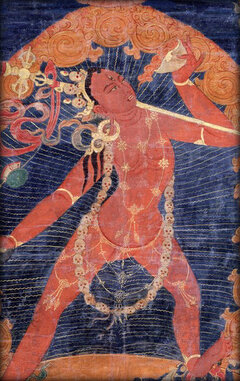Feast Song to Vajrayoginī
༄༅། །རྗེ་བཙུན་རྡོ་རྗེ་རྣལ་འབྱོར་མའི་ཚོགས་ཀྱི་མཆོད་པའི་རྡོ་རྗེའི་གླུ་བདེ་ཆེན་རྟག་པ་དམ་པའི་སྤྲིན་གྱི་རོལ་མོ་ཞེས་བྱ་བ། །
Harmonious Clouds of Sublime and Lasting Bliss
A Vajra Song for the Tsok Feast Offering to Venerable and Exalted Vajrayoginī
by Jamyang Khyentse Wangpo
འོད་གསལ་རྣམ་ཀུན་མཆོག་ལྡན་ཡེ་ཤེས་ཀྱི་རོལ་མོ། །
ösal namkün chokden yeshe kyi rolmo
As the play of clear light, primordial wisdom endowed with the supreme of all skilful means,
ཟུང་འཇུག་དྭངས་མའི་གཟུགས་སྐུར་མངོན་སུམ་དུ་ཤར་བ། །
zungjuk dangmé zukkur ngönsum du sharwa
Their union appears before us in the subtle rūpakāya form,
དྲན་པས་སྙིང་གི་གདུང་སེལ་དཔལ་ལྡན་གྱི་བླ་མས། །
drenpé nying gi dung sel palden gyi lamé
Glorious guru, the very thought of whom dispels all anguish—
བདེ་སྟོང་ཡེ་ཤེས་སྐྱེ་བར་བྱིན་གྱིས་རང་རློབས་ཤིག །
detong yeshe kyewar jin gyi rang lob shik
Grant your blessings so that the wisdom of bliss-emptiness dawns within my mind!
ཨེ་དབྱིངས་ཤིན་ཏུ་རྣམ་དག་སྤྲོས་བྲལ་གྱི་གནས་ལུགས། །
é ying shintu namdak trödral gyi neluk
É is all-pervading space, the natural state, utterly pure, beyond elaboration,
ཝྃ་ཡིག་བཅུ་དྲུག་དགའ་བའི་མཚན་དཔེ་རུ་བཞེངས་པའི། །
wam yik chudruk gawé tsenpé ru zhengpé
And the syllable vaṃ manifests as the signs and marks of sixteenfold joy—
ལྷན་སྐྱེས་མཁའ་ལ་སྤྱོད་པ་རྣལ་འབྱོར་གྱི་དབང་མོས། །
lhenkyé kha la chöpa naljor gyi wang mö
Spontaneously born,1 sky-faring Khecarī, Lady of Yoginīs,
རླུང་སེམས་དབུ་མར་ཐིམ་པའི་དངོས་གྲུབ་ཞིག་སྩོལ་དང༌། །
lungsem umar timpé ngödrub zhik tsol dang
Grant me the siddhi of subtle energy-mind dissolving within the central channel!
ཡུལ་ཆེན་ཉི་ཤུ་རྩ་བཞིར་རང་བཞིན་གྱིས་སྣང་བའི། །
yul chen nyishu tsa zhir rangzhin gyi nangwé
Naturally appearing in the twenty-four sacred places,
ཐབས་ཤེས་ཕྱག་རྒྱའི་གཟུགས་འཆང་དཔའ་བོ་དང་མཁའ་འགྲོས། །
tabshé chakgyé zuk chang pawo dang khandrö
Taking the form of skilful means and wisdom mudrās, ḍākas and ḍākinīs,
ཞིང་སྐྱེས་ཕོ་ཉའི་ཚོགས་ཀྱི་འདུ་བ་ལ་བརྟེན་ནས། །
zhing kyé ponyé tsok kyi duwa la ten né
Pureland-born messengers—through your gathering for the tsok feast,
བདེ་ཆེན་ཉམས་བརྒྱས་སྒེག་པའི་སྐལ་བཟང་ལ་སྦྱོར་ཞིག །
dechen nyam gyé gekpé kalzang la jor zhik
May I enjoy the fortunate enrapture of a hundred sensations of great bliss.
སྟོང་ཉིད་མཁའ་ལ་བྲིས་པའི་ཏིང་འཛིན་གྱི་ཉམས་འགྱུར། །
tongnyi kha la dripé tingdzin gyi nyamgyur
The expressions of your samādhi adorn the sky of emptiness,
ངོ་མཚར་དབང་པོའི་གཞུ་བཞིན་སྣ་ཚོགས་སུ་འཆར་བའི། །
ngotsar wangpö zhu zhin natsok su charwé
As amazing and as varied as a rainbow—the ‘bow of Indra’—
སྔགས་སྐྱེས་རྡོ་རྗེ་བཙུན་མོའི་བསམ་གཏན་གྱི་དགའ་མ། །
ngak kyé dorjé tsünmö samten gyi ga ma
Mantra-born yoginī, Vajra Queen, lady of samādhi’s joy,
ཅིར་སྣང་བདེ་ཆེན་འདྲེན་པའི་སྐྱོ་གྲོགས་ལ་ཕེབས་དང༌། །
chir nang dechen drenpé kyo drok la peb dang
Come now, as a consoling friend and consort to transform appearances into ecstasy supreme!
རྨད་བྱུང་རྡོ་རྗེ་ཐེག་པའི་ལམ་བཟང་གི་མཐར་ཐུག །
mejung dorjé tekpé lamzang gi tartuk
Here, at the zenith of the wondrous vajra vehicle’s sublime path,
རྣལ་འབྱོར་གསང་མཐའི་བདུད་རྩིའི་དགའ་སྟོན་ལ་སྤྱོད་པས། །
naljor sang té dütsi gatön la chöpé
Through this practice of enjoying the feast of ultimate secret nectar,
བརྟན་གཡོའི་ཚུལ་དུ་ཤར་བའི་ཐ་མལ་གྱི་དངོས་ཀུན། །
tenyö tsul du sharwé tamal gyi ngö kün
May all ordinary appearances of the environment and beings
ཧེ་རུ་ཀ་དཔལ་འགྲུབ་པའི་སྨོན་ལམ་ཞིག་ཞུའོ། །
heruka pal drubpé mönlam zhik zhu’o
Be perfected as the glorious heruka—this aspiration, I offer!
ཞེས་པའང་འཇམ་མགོན་བླ་མ་རིན་པོ་ཆེ་ངག་གི་དབང་ཕྱུག་བྱམས་པ་ཕུན་ཚོགས་དཔལ་བཟང་པོས་འདི་སྟར་བྲིས་ཞེས་རྡོ་རྗེའི་བཀའ་སྩལ་སྤྱི་བོར་མཆོད་དེ། བྱ་བྲལ་བ་ཀུན་ཏུ་རྒྱུ་མཉྫུ་གྷོཥས་གསོལ་བ་བཏབ་པའི་སིདྡྷི་རསྟུ།། །།
This prayer by the wandering yogin of non-action, Mañjughoṣa, was made in response to the command of the precious Jamgön Lama, the Lord of Speech, Jampa Phuntsok Pal Zangpo, whose vajra words “Compose something along these lines!” I took as an offering upon the crown of my head. Siddhirastu!
| Rigpa Translations, 2009. Edited and adapted for Lotsawa House, 2021.
Source:
mkhyen brtse'i dbang po. "tshogs glu bde chen rtag pa dam pa'i sprin gyi rol mo/ nA ro mkha' spyod ma/" in gsung 'bum/_mkhyen brtse'i dbang po/. TBRC W21807. 24 vols. Gangtok: Gonpo Tseten, 1977–1980. Vol. 7: 462–463
Version: 1.4-20251127
- ↑ The text makes reference to the three kinds of yoginī or ḍākinī: 1) the spontaneously born (lhan skyes ma), who has realized primordial wisdom, 2) the pureland-born (zhing skyes ma) from one of the twenty-four sacred places, and 3) the mantra-born (sngags skyes ma), who understands the practices of the generation and completion phases, but has not yet fully realized primordial wisdom.
